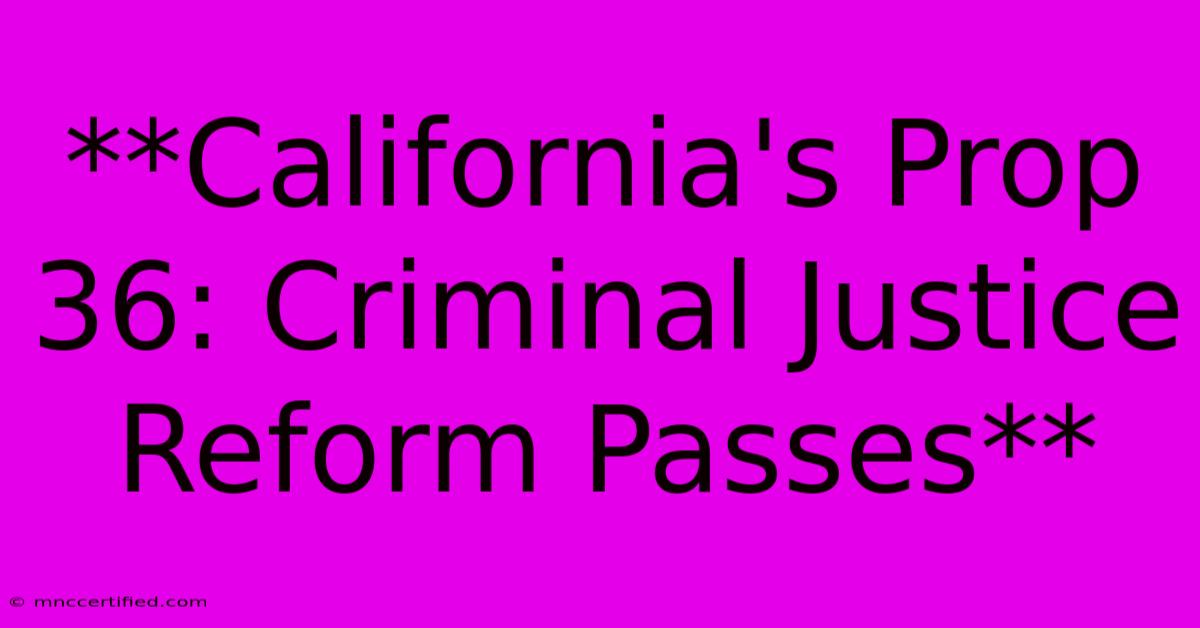**California's Prop 36: Criminal Justice Reform Passes**

Table of Contents
California's Prop 36: Criminal Justice Reform Passes, Ushering in a New Era of Sentencing
On November 8, 2022, California voters approved Proposition 36, a landmark initiative aiming to reform the state's criminal justice system. This significant victory for advocates of criminal justice reform marks a major shift in how California approaches drug-related offenses, particularly for nonviolent offenders.
What Does Prop 36 Entail?
Prop 36 focuses on two key areas:
- Reducing Sentences for Drug Offenses: The proposition reduces the maximum prison sentence for certain drug offenses, including possession of controlled substances for personal use. This change aims to divert individuals from incarceration to treatment programs, recognizing the impact of substance use disorder as a health issue.
- Expanding Access to Treatment: Prop 36 mandates that individuals convicted of eligible drug offenses be offered a substance use disorder treatment program instead of prison time. This initiative emphasizes rehabilitation over punishment, providing a path toward recovery and reducing recidivism rates.
Impact and Implications of Prop 36
The passage of Prop 36 has several significant implications:
- Reduced Incarceration Rates: By shifting from incarceration to treatment for nonviolent drug offenses, Prop 36 is expected to significantly reduce California's prison population. This move aligns with the growing national trend of decarceration, advocating for more humane and effective approaches to criminal justice.
- Focus on Rehabilitation: The emphasis on treatment programs recognizes the complex nature of substance use disorder and prioritizes rehabilitation over punishment. This shift could lead to a more effective and compassionate approach to addressing drug use in the state.
- Cost Savings: While the exact financial impact is still being analyzed, Prop 36 is projected to generate cost savings for the state by reducing the need for expensive prison infrastructure and staff. These savings can be redirected towards strengthening treatment programs and supporting other critical social services.
Challenges and Concerns
Despite the widespread support for Prop 36, some challenges remain:
- Implementation and Funding: Successful implementation of Prop 36 will require sufficient funding and robust support from state and local governments. Ensuring adequate resources for treatment programs and supporting services is crucial for the initiative's success.
- Access to Treatment: Ensuring equal access to treatment programs for all eligible individuals is essential. Geographic disparities and limited resources can pose challenges in reaching those who need support.
- Potential for Overcrowding in Treatment Facilities: As more individuals are diverted to treatment programs, concerns exist regarding potential overcrowding and strain on existing resources. Effective planning and resource allocation are vital to address this issue.
Moving Forward with Prop 36
The passage of Prop 36 marks a significant milestone in California's criminal justice reform journey. Its success hinges on effective implementation, adequate funding, and ongoing collaboration between government agencies, treatment providers, and community organizations. By embracing a more humane and rehabilitative approach, Prop 36 holds the potential to create a fairer and more just system for all Californians.
Keywords: Prop 36, California, criminal justice reform, drug offenses, sentencing, treatment programs, rehabilitation, incarceration, recidivism, cost savings, implementation, funding, access to treatment, overcrowding.

Thank you for visiting our website wich cover about **California's Prop 36: Criminal Justice Reform Passes** . We hope the information provided has been useful to you. Feel free to contact us if you have any questions or need further assistance. See you next time and dont miss to bookmark.
Featured Posts
-
Brugge Wins Aston Villa Lose On Mings Penalty
Nov 07, 2024
-
Control Of Us Senate Swings To Gop
Nov 07, 2024
-
Why Bayern Munichs Game Was Delayed
Nov 07, 2024
-
Setbacks Cant Stop Republican Election Denial
Nov 07, 2024
-
Do You Need Insurance To Get An Inspection
Nov 07, 2024